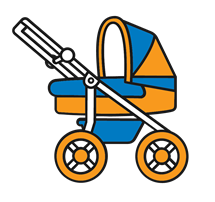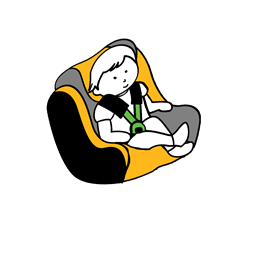 There are so many lovely things to buy for babies these days. Adverts are very tempting and can make you feel that you ‘must have’ their product.
There are so many lovely things to buy for babies these days. Adverts are very tempting and can make you feel that you ‘must have’ their product.
Famous celebrities may advertise baby products but that does not mean they are needed or safe.
Many people are getting ready for their baby on a budget and it can be hard to know what you ‘need’ to have rather than what it would be ‘nice’ to have.
It can be quite reassuring to see that new babies don’t need as much as you might think.
You will be able to care for your baby well and safely if you have these things;
Remember - different family’s budgets to buy the essentials will vary a lot. There may well be other things that you want to have – it is exciting choosing things for your baby.
A Safe Place To Sleep
Babies should only sleep in something that has been especially designed for a baby to sleep in. This is because it reduces the risk of Sudden Infant Death Syndrome (Cot Death).
Their cot or crib should be kept clear of anything other than bed linen. This keeps your baby as safe as possible as they sleep.
You will need about three sets of bottom sheets for your cot or crib (one clean, one dirty, one being used) and either a set of cellular / honeycomb blankets, baby sleeping bags or swaddle blankets.
Prams, cribs, Moses baskets and cots are safe for your baby if;
If you are buying a second hand crib, cot or pram;
Car Seats
It is the law that all babies and children use a car seat until they are 12 years old (or 135cms whichever comes first). Even if you do not own a car it is likely that at some point your baby will need to travel in a vehicle.
is the law that all babies and children use a car seat until they are 12 years old (or 135cms whichever comes first). Even if you do not own a car it is likely that at some point your baby will need to travel in a vehicle.
It is generally advised that the return journey after having your baby is not on public transport and you will need your baby car seat to go home from hospital.
It is recommended that car seats are bought new because you cannot be certain that a second hand car seat has never been in an accident.
Car seats should just be used for travel – they are not suitable for babies to sit in for long periods. They can make it harder for your baby to keep their oxygen at a safe level. They are not good for developing spines.
Car seat manufacturers recommend the 2 Hour Rule. This means babies should spend no longer than 2 hours in a car seat in a 24 hour period. If you are travelling a distance you should stop for breaks and get your baby out of their seat.
Something to Get Out And About In
Slings
It is good for babies and their parents to get out of the house from their earliest days. You will need something safe and comfortable to do so. You might choose to use a sling – holding your baby close helps with bonding. There are many types of sling and it is up to you what you think will work best.
It is important that slings are used safely. Follow the Sling Safety Checklist when choosing and using a carrier.
Prams and Pushchairs
There’s a huge range of prams and pushchairs out there. The cost varies a lot. The most expensive are not necessarily better. Look for;
a huge range of prams and pushchairs out there. The cost varies a lot. The most expensive are not necessarily better. Look for;
Second hand prams are readily available and can be very good value for money.
Check that;
Baby Clothes
Baby clothes are hard to resist. There is loads of choice. It is easy to get carried away and buy more than you need.
Friends and family often buy baby clothes as gifts - it is worth asking them to buy some bigger sizes or ask for vouchers.
Hand-me-downs and second hand baby clothes are a good option – they rarely get worn out. Buy from smoke free homes and wash before use.
Equipment To Give Milk Safely
Whether you are breast or bottle feeding it is important to have a way of sterilising your baby's feeding equipment. Anything apart from a breast that is going to come in contact with your baby’s mouth or the milk they drink, should be sterilised.
The following items all need to be sterilised;
You don’t have to spend a lot of money – you can use a plastic container with a lid and sterilising solution. Just make sure all equipment is completely covered by the sterilising fluid. There are steam and microwave sterilisers available too. Whatever you choose be sure to follow all instructions carefully.
In recent times formula milk preparation machines have become available e.g. ‘Perfect Prep’. They are not recommended by health experts because there is doubt that the milk is prepared at a safe temperature to kill bacteria.
You can read more about these concerns at First Steps Nutrition.
If you feel worried and would like more advice you can speak to your midwife throughout your pregnancy and up to 28 days after the birth of your baby.
If you live in Norfolk
If you live in Suffolk